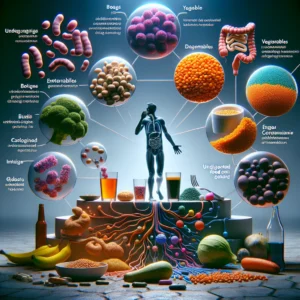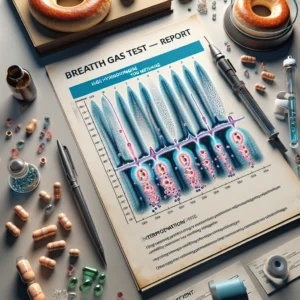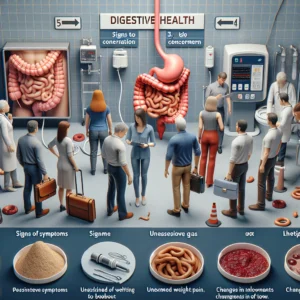Boost Your Digestive Health: Use Breath Gas Chromatography for Effective Bloating Relief
Bloating is not just a minor annoyance; it’s a prevalent and often distressing condition that affects countless individuals. This discomfort manifests as a feeling of excessive fullness and swelling in the abdomen and can trigger various troubling symptoms, such as abdominal pain, fatigue, and social embarrassment. While occasional instances of bloating are often linked to specific dietary choices or eating habits, chronic or severe cases may signal a more serious digestive issue that warrants medical attention. Understanding the intricate mechanisms contributing to bloating is crucial for effectively managing symptoms and promoting lasting digestive health.
Recognizing and addressing the root causes of bloating is vital for achieving lasting relief from discomfort. Breath gas testing has emerged as a groundbreaking diagnostic tool in the realm of gastrointestinal health, providing a non-invasive way for healthcare professionals to evaluate the gases present in a patient’s breath. This advanced analysis yields valuable insights into digestive processes and helps pinpoint underlying issues that contribute to bloating, allowing for more focused and effective treatment interventions.
Breath gas chromatography is instrumental in identifying imbalances within the gut microbiome and diagnosing disorders such as small intestinal bacterial overgrowth (SIBO). By analyzing specific gases like hydrogen and methane, this innovative technique not only aids in diagnosing the fundamental causes of bloating but also plays a crucial role in developing personalized treatment strategies that effectively alleviate discomfort and improve overall digestive function.
Actionable Strategies for Managing Bloating and Excess Gas Effectively
- Bloating and excessive gas can significantly disrupt your daily life, affecting both physical comfort and emotional well-being.
- Understanding the common factors contributing to bloating and gas, such as dietary habits, medical conditions, and lifestyle choices, is essential for effective management.
- Utilizing breath gas testing offers a non-invasive diagnostic approach to identify specific gases present in breath samples.
- Analyzing breath gas test results can uncover conditions such as lactose intolerance and SIBO.
- Implementing effective management strategies for bloating and excessive gas typically involves dietary adjustments, medications, and lifestyle changes.
 Identify and Manage Main Triggers of Bloating and Excess Gas for Enhanced Comfort
Identify and Manage Main Triggers of Bloating and Excess Gas for Enhanced Comfort
Bloating and excessive gas can arise from numerous underlying factors, making it critical to identify these triggers for effective management. One of the significant contributors is dietary choices, particularly the intake of high-fiber foods or fermentable carbohydrates, which can elevate gas production during digestion. Foods such as beans, lentils, cruciferous vegetables, and carbonated beverages are notorious for causing uncomfortable bloating sensations.
Moreover, habits like eating too quickly or consuming large meals can worsen bloating by allowing excess air to be swallowed. Another crucial factor influencing bloating is the condition of your gut microbiome. An imbalance in the diversity and quantity of bacteria in your intestines can disrupt normal digestive functions, leading to discomfort.
For example, an overabundance of bacteria in the small intestine may result in the fermentation of undigested food, leading to increased gas production. This condition, known as SIBO, can cause chronic bloating and significant discomfort. Additionally, elevated levels of stress and anxiety can further exacerbate bloating symptoms by interrupting normal digestive processes and hindering gut motility.
Comprehensive Diagnostic Approaches for Chronic Bloating and Excess Gas
When dealing with persistent bloating and excessive gas, it is essential to adopt a thorough diagnostic approach to uncover the underlying causes. Typically, a healthcare provider will start with an in-depth medical history and physical examination to evaluate your symptoms and any contributing factors. This evaluation may involve discussing your eating patterns, lifestyle choices, and any additional symptoms you may be experiencing.
This comprehensive assessment helps refine potential causes and determine the most appropriate diagnostic tests. Alongside a thorough history and physical examination, various diagnostic techniques may be employed to identify the origins of your bloating. Blood tests can help rule out conditions like celiac disease or infections, while imaging studies, such as ultrasounds or CT scans, can reveal structural abnormalities within the gastrointestinal tract.
Breath gas testing has gained recognition as a valuable tool for diagnosing specific conditions like SIBO, enabling a more focused and effective treatment approach tailored to individual needs.
The Transformative Role of Breath Gas Testing in Diagnosing Digestive Disorders
Breath gas testing, primarily through the use of Breath Gas Chromatography, has transformed the diagnostic capabilities available to healthcare providers addressing digestive disorders linked to bloating. This non-invasive procedure typically involves the ingestion of a specific substrate—often lactulose or glucose—followed by the collection of breath samples at scheduled intervals. As the substrate traverses the digestive tract, it is fermented by any excessive bacteria present.
The resulting gases, mainly hydrogen and methane, are then measured from the collected breath samples. The scientific basis of breath gas testing lies in its ability to detect abnormal levels of these gases, which may suggest bacterial overgrowth or premature fermentation processes occurring in the small intestine. For instance, when SIBO is present, bacteria ferment the substrate prematurely, resulting in elevated levels of hydrogen or methane in the breath.
This method not only provides essential diagnostic information but also guides treatment strategies customized to your unique digestive condition, enhancing the likelihood of successful outcomes.
 Interpreting Breath Gas Test Results for Tailored Treatment Solutions
Interpreting Breath Gas Test Results for Tailored Treatment Solutions
Understanding breath gas test results requires a nuanced comprehension of the implications associated with hydrogen and methane levels in relation to your digestive health. Elevated hydrogen levels often indicate bacterial overgrowth in the small intestine, which ferments carbohydrates too soon during digestion. Conversely, high methane levels may suggest a different type of bacterial overgrowth that leads to constipation and various gastrointestinal complications.
Your healthcare provider will evaluate the timing and magnitude of gas production against your substrate ingestion. A rapid increase in hydrogen or methane levels shortly after consumption can confirm a diagnosis of SIBO or related disorders. Grasping these results is essential for formulating an effective treatment plan that addresses both the symptoms of bloating and the underlying factors contributing to your discomfort.
Customizing Treatment Plans for Effective Relief from Bloating and Excessive Gas
Once breath gas testing or other diagnostic methods have confirmed a diagnosis, treatment options for bloating and excessive gas can be specifically tailored to meet your individual needs. If SIBO is identified as the primary cause, your healthcare provider may prescribe antibiotics to eliminate the bacterial overgrowth in your small intestine. Rifaximin is a commonly used antibiotic that targets harmful bacteria without significantly disrupting the gut microbiome.
In addition to antibiotic therapy, dietary changes can play a pivotal role in managing bloating and excessive gas. Adopting a low-FODMAP diet may alleviate symptoms by diminishing specific fermentable carbohydrates that can worsen bloating. Furthermore, probiotics may be suggested to help restore balance within your gut microbiome, thereby enhancing overall digestive health.
Your healthcare provider will collaborate with you to develop a comprehensive treatment strategy that addresses immediate symptoms while promoting long-term gut health and overall wellness.
Adopting Lifestyle Changes for Effective Management of Bloating and Excess Gas
Making lifestyle adjustments can significantly enhance your ability to effectively manage bloating and excessive gas. One fundamental strategy is to embrace mindful eating practices. By taking your time during meals, thoroughly chewing your food, and limiting distractions, you can minimize the amount of air swallowed, which can help reduce gas production.
Additionally, consider transitioning to smaller, more frequent meals instead of consuming large portions that may overwhelm your digestive system. Regular physical activity is also essential for managing bloating effectively. Engaging in moderate exercise can stimulate healthy digestion and alleviate feelings of fullness or discomfort.
Activities such as walking, yoga, or swimming can promote gut motility and help relieve bloating symptoms. Ensuring adequate hydration is equally important; drinking sufficient water throughout the day supports digestion and helps prevent constipation, which can further contribute to bloating.
 When to Consult a Healthcare Professional About Bloating and Excess Gas
When to Consult a Healthcare Professional About Bloating and Excess Gas
While occasional bloating and excessive gas episodes are common, certain situations require prompt medical consultation. If you notice that your symptoms are persistent or worsening over time, it’s crucial to seek the advice of a healthcare professional for further evaluation. Additionally, if you experience severe abdominal pain, unexplained weight loss, changes in bowel habits, or blood in your stool, these symptoms may indicate more serious underlying conditions that necessitate urgent care.
Taking proactive steps for your digestive health is essential for maintaining overall well-being. By thoroughly understanding the potential causes of bloating and utilizing diagnostic tools like breath gas testing, you empower yourself on your health journey. Effective management often requires a combination of medical intervention, dietary adjustments, and lifestyle changes tailored to your specific needs.
Do not hesitate to seek help when necessary; addressing these issues early can greatly improve your quality of life and enhance comfort in daily activities.
If you are interested in exploring alternative therapies for weight loss, consider acupuncture. A recent article on mcrtherapies.co.uk highlights acupuncture as an effective method for individuals looking to meet their weight loss objectives. By targeting specific points within the body, acupuncture can help regulate metabolism, reduce cravings, and enhance digestion. This holistic approach may be particularly advantageous for those facing bloating and other digestive challenges.
Common Questions About Managing Bloating and Gas
What is bloating, and what factors contribute to its occurrence?
Bloating is characterized by a sensation of fullness or tightness in the abdomen, often accompanied by visible swelling or distention. Various factors, including gas retention, fluid accumulation, and digestive complications, can lead to this uncomfortable feeling.
How does breath gas testing operate?
Breath gas testing is a non-invasive diagnostic procedure that measures specific gases in a person’s breath. This assessment can help identify gastrointestinal disorders, such as Small Intestinal Bacterial Overgrowth (SIBO) and lactose intolerance.
What is involved in the breath gas testing procedure?
During breath gas testing, the participant exhales into a specialized device designed to collect and analyze their breath. The levels of hydrogen, methane, and other gases that may suggest specific digestive issues are then measured and assessed.
Which conditions can breath gas testing assist in identifying?
Breath gas testing can help diagnose conditions such as SIBO, lactose intolerance, fructose malabsorption, and several other gastrointestinal disorders that may result in bloating and discomfort.
What are the advantages of breath gas testing?
Breath gas testing is non-invasive and typically straightforward to perform. It delivers valuable insights into an individual’s digestive health and aids healthcare providers in crafting personalized treatment plans to address specific gastrointestinal issues.
Are there any risks or side effects associated with breath gas testing?
Breath gas testing is considered safe and is generally well-tolerated. Some individuals might experience mild discomfort or dizziness from repeated breath sampling; however, serious side effects are rare. It is essential to adhere to any pre-test instructions provided by your healthcare professional.
Proudly Presented By: Experts in Bloating Treatment
The Article: Bloating and Breath Gas Testing: An Effective Diagnostic Method appeared first on https://mcrtherapies.co.uk
The Article Bloating and Breath Gas Testing for Accurate Diagnosis appeared first on https://mcrtherapies.com
The Article Bloating and Breath Gas Testing for Accurate Diagnosis Solutions Was Found On https://limitsofstrategy.com
References:
Bloating and Breath Gas Testing for Accurate Diagnosis Solutions




It’s fascinating how we often overlook the profound impact our digestive health has on our overall well-being. Bloating, as you pointed out, isn’t just an uncomfortable inconvenience; it can permeate our daily lives and affect our emotional states. I’ve personally experienced how certain foods can trigger this distressing sensation, and it’s frustrating when, despite making what seems to be healthy choices, the results are still uncomfortable.